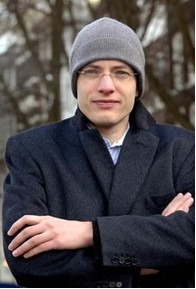 畅销作家兼哲学家艾伦·德波顿(Alain de Botton)出生于瑞士苏黎世,曾出版了多本著作,其中包括:《旅行的艺术》(The Art of Travel)、《快乐的构建》(The Happiness of Architecture)、《哲学的慰藉》(The Consolations of Philosophy)、《普鲁斯特如何改变你的生活》(How Proust Can Change Your Life)等。其文字特点是喜欢将自身经历与艺术家、哲学家的思想结合起来,这种风格被喻为“日常生活的哲学”(Philosophy of Everyday Life)。
畅销作家兼哲学家艾伦·德波顿(Alain de Botton)出生于瑞士苏黎世,曾出版了多本著作,其中包括:《旅行的艺术》(The Art of Travel)、《快乐的构建》(The Happiness of Architecture)、《哲学的慰藉》(The Consolations of Philosophy)、《普鲁斯特如何改变你的生活》(How Proust Can Change Your Life)等。其文字特点是喜欢将自身经历与艺术家、哲学家的思想结合起来,这种风格被喻为“日常生活的哲学”(Philosophy of Everyday Life)。
《The Art of Travel》这部纪录片根据德波顿2002年出版的同名书制作。与原书一样,纪录片就像一段完美的旅程,教我们如何好奇、思考和观察,让我们重新对生命充满热情。
在影片中,作者从一个个我们在旅行中司空见惯的细节入手,启发人们的思考。在此,我们选取了作者对人们都很熟悉的旅游指南的思考。
Have you ever stood…in a beautiful 1)piazza…in front of a landmark building…in a European city…on a weekend city break…and wondered, with 2)mounting anxiety, “What am I doing here?” “What am I supposed to feel?”
Or perhaps you’ve got back to your hotel and 3)slumped onto the bed, filled with 4)listlessness and self-disgust, unable to face another “must-see” attraction. The guidebook has given you a bad case of “culture guilt.”
One of the things that we’re supposed to have in bucket loads when we travel is curiosity. Open the average guidebook to the average city and you’ll find a whole menu of things that you’re supposed to be very keen to go and see—a town hall, 10 churches or so, 5)five men on horsebacks in museums and shopping 6)arcades.
And yet, oppressed by this degree of choice, we may wonder what, if anything, we’re genuinely curious about.
你是否有过这样的经历:在某市作一次周末旅游的时候……在某一个欧洲城市……站在一座地标建筑前的……一个华丽的广场上,焦虑情绪不断积聚,你问自己:“我在这儿干嘛?”“我应该有什么样的感受?”
也许你会回到旅馆,瘫倒在床上,兴味索然,无精打采,提不起精神去参观下一个“不可错过”的景点。这意味着你陷入了旅游指南给你带来的“文化愧疚感”。
我们外出旅行的时候,理应是极有好奇心的。随意翻开一本普通城市的旅游指南,上面会有一大串你本应迫不及待想去做的事和参观的景点:市政厅、十来座教堂、博物馆里五人骑在马背上的图片展,以及购物等等。
可是,受如此多游览选择的困扰,我们可能会产生疑问:如果我们真的有好奇心的话,我们究竟想知道些什么呢?
Host: I’m in the car with Briony Hellis, somewhere in the windswept flatlands of the eastern Netherlands. Briony’s husband, John, was on the hunt for World War II 7)bunkers. These tend not to feature in guidebooks.
John: I definitely know. I definitely know they were here. Ah, there’s one. There is yet another one. Oh, there’s another one! Oh, my goodness gracious me!…And another. And one on the dune’s there. I think we have to stop here.
Host: Well, it’s huge!
John: Oh, yes.
Host: It’s like an Egyptian burial chamber.
John: Ah, yes, look at that.
Host: So you never get bored on holiday, do you?
John: No. No, because not only do you look at the concrete, but how many people would drive through an industrial estate, as we did today, and how many people see that side of the holiday?
Guidebooks distort the psychology of our curiosity. They present a vision of the world where everything is already known, already measured and appraised. Their judgments are not necessarily false, but their effect can be8)pernicious. It’s as if, after each authoritative entry, they’ve added “and there’s something weird about anyone who doesn’t agree.”
Host: How do people develop passions?
John: I think there’s a certain level of nosiness, 9)inquisitiveness.
Briony: Hmm.
John: You’re just asking questions all the time, and so why, you know, “Why are these here?”
Briony: Because it opens your eyes up to other things as well.
John: Yeah. Exactly! That…that’s the point. The…the bunkers were where it started, but we’ve learned to look around. We’re no longer focused at ground level.
Host: And yet, then you get these listless large groups of tourists…
Briony: Hmm.
Host: …just wandering around, not knowing what to look at.
Briony: Yawning.
Host: Yawning.
John: And they’re all looking at the guide—and “what is the guide going to tell me next?” —and no one is looking around, and no one is saying, “Excuse me, what’s that building?”, because their life is focused on the guidebook.
We should learn to nourish the shoots of our own wayward curiosity. And we should learn to treat with care that most 10)prescriptive, most enthusiasm-destroying of travel implements, the guidebook.
主持人:我现正与布莱尼·赫利斯坐在车里,我们身处荷兰东部常年受大风侵袭的平原上。布莱尼的丈夫约翰正在寻找二战遗留下来的掩体,而这些通常不会出现在旅游指南里。
约翰:我确实知道。我知道它们肯定在这儿。啊,那有一个。还有另一个。哦,又有一个!啊呀,乖乖!又有一个!那边的小土丘又有一个。我想我们得在这儿停一下。
主持人:嗯,这很大啊!
约翰:哦,是的。
主持人:这看上去像古埃及人的墓室。
约翰:对。看看那儿。
主持人:这么说你外出度假就从来都不会厌倦,对吗?
约翰:不会,不会的。因为我不仅仅有机会看到这些土墙,而且有多少人会像我们今天这样驱车驶过工业区?又有多少人可以看到外出度假的另一面呢?
旅游指南扭曲了我们好奇的心理。这些书向我们展示的世界是广为人知的,是被多次斟酌推敲,并经过认真评估的。书中的定论不一定是错的,但它们所起的作用可能是有害的。这就像是在每一个权威性的介绍条目后面,他们加上了“如果有人不同意这个结果,那是不可思议的事”的文字。
主持人:人们的热情从何而来?
约翰:我想,人得有爱管闲事的天性和比较强的好奇心。
布莱尼:嗯。
约翰:你得不停地提问,比如说:“这些怎么会在这儿?”
布莱尼:因为它让你对其他事情也有所了解。
约翰:对,太对了!这正是关键。这些掩体只不过是一个起点,但我们学会了了解周围的世界,我们已经不仅仅是把注意力放在表面的东西。
主持人:可是,你会看到一群群无精打采的游客……
布莱尼:嗯对。
主持人:到处逛,却不知道自己在看什么。
布莱尼:打着呵欠。
主持人:打呵欠。
约翰:他们都在看着导游,脑子里在想:“导游又要给我介绍些什么?”——但没有人会环顾四周,问:“劳驾,那幢楼是什么?”因为他们行程的注意力都集中在旅游指南上。
我们应该学会培养自己发散性的好奇心。对于那些毫无商量余地,然而却又是最能给我们的热情泼冷水的旅行装备——旅游指南,我们应该学会谨慎对待。
翻译:木乃伊



